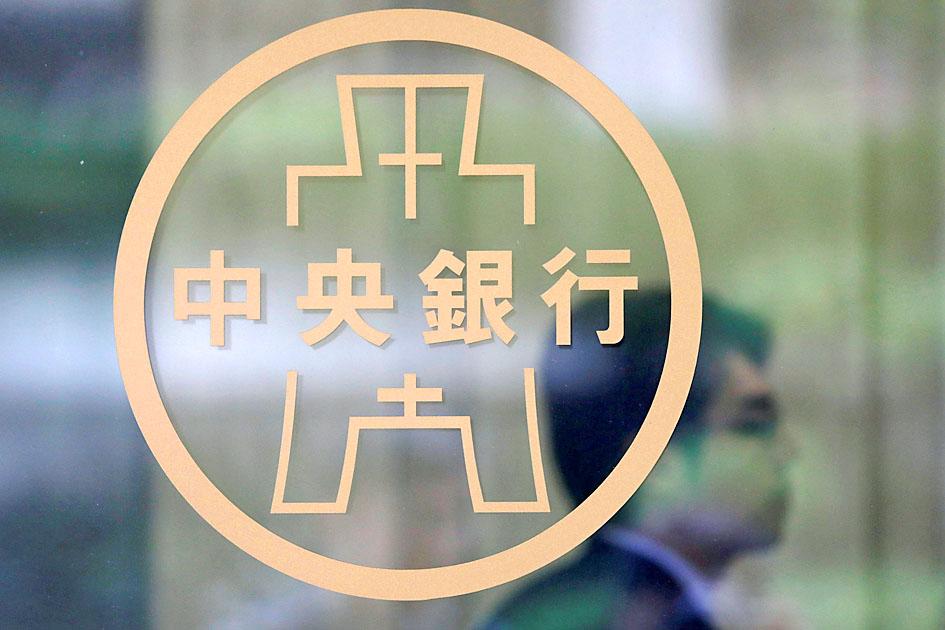The central bank on Friday met with 36 domestic lenders, asking them to comply with risk management requirements and refrain from cutthroat competition in mortgage operations.
The plea came after housing and construction lending continued to grow last quarter despite two waves of selective credit controls intended to cool the local property market.
The central bank said it has since January been inspecting mortgage operations and found that most lenders abide by risk management rules.

Photo: Tyrone Siu, Reuters
However, some lenders failed to exercise caution by offering interest rates that were below market average, it said.
“Banks must factor in funding costs, operating overhang, potential credit losses and other things when setting interest rates for real-estate property lending,” the central bank said in a statement released after the closed-door meeting.
The central bank has held several meetings over the past few months calling for self-restraint on the part of lenders, aiming to curb hikes in property prices caused by low interest rates and excessive liquidity after global central banks printed money to ease the effects of the COVID-19 pandemic.
Under-par interest rates are unfavorable for risk controls and pose a threat to the stability of the nation’s financial market, the central bank said, asking top executives at local banks to oversee internal pricing practices.
The central bank had earlier said it was displeased that local lenders’ housing and construction lending had not yet responded to credit tightening it introduced in December last year and March.
The central bank said that some officials have suggested more drastic steps to rein in the property market, while others believe more time is needed to judge the success of credit controls.
Central bank Governor Yang Chin-long (楊金龍) has told lawmakers that, if necessary, he might further tighten lending terms at the bank’s quarterly board meeting next month.

COMPETITION: AMD, Intel and Qualcomm are unveiling new laptop and desktop parts in Las Vegas, arguing their technologies provide the best performance for AI workloads Advanced Micro Devices Inc (AMD), the second-biggest maker of computer processors, said its chips are to be used by Dell Technologies Inc for the first time in PCs sold to businesses. The chipmaker unveiled new processors it says would make AMD-based PCs the best at running artificial intelligence (AI) software. Dell has decided to use the chips in some of its computers aimed at business customers, AMD executives said at CES in Las Vegas on Monday. Dell’s embrace of AMD for corporate PCs — it already uses the chipmaker for consumer devices — is another blow for Intel Corp as the company

MediaTek Inc (聯發科) yesterday said it is teaming up with Nvidia Corp to develop a new chip for artificial intelligence (AI) supercomputers that uses architecture licensed from Arm Holdings PLC. The new product is targeting AI researchers, data scientists and students rather than the mass PC market, the company said. The announcement comes as MediaTek makes efforts to add AI capabilities to its Dimensity chips for smartphones and tablets, Genio family for the Internet of Things devices, Pentonic series of smart TVs, Kompanio line of Arm-based Chromebooks, along with the Dimensity auto platform for vehicles. MeidaTek, the world’s largest chip designer for smartphones

TECH PULL: Electronics heavyweights also attracted strong buying ahead of the CES, analysts said. Meanwhile, Asian markets were mixed amid Trump’s incoming presidency Taiwan Semiconductor Manufacturing Co (TSMC, 台積電) shares yesterday closed at a new high in the wake of a rally among tech stocks on Wall Street on Friday, moving the TAIEX sharply higher by more than 600 points. TSMC, the most heavily weighted stock in the TAIEX, rose 4.65 percent to close at a new high of NT$1,125, boosting its market value to NT$29.17 trillion (US$888 billion) and contributing about 400 points to the TAIEX’s rise. The TAIEX ended up 639.41 points, or 2.79 percent, at 23,547.71. Turnover totaled NT$406.478 billion, Taiwan Stock Exchange data showed. The surge in TSMC follows a positive performance

FUTURE TECH: Nvidia CEO Jensen Huang would give the keynote speech at this year’s Consumer Electronics Show, which is also expected to highlight autonomous vehicles Gadgets, robots and vehicles imbued with artificial intelligence (AI) would once again vie for attention at the Consumer Electronics Show (CES) this week, as vendors behind the scenes would seek ways to deal with tariffs threatened by US president-elect Donald Trump. The annual Consumer Electronics Show opens formally in Las Vegas tomorrow, but preceding days are packed with product announcements. AI would be a major theme of the show, along with autonomous vehicles ranging from tractors and boats to lawn mowers and golf club trollies. “Everybody is going to be talking about AI,” Creative Strategies Inc analyst Carolina Milanesi said. “From fridges to ovens